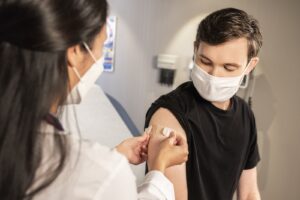University of Cincinnati research examines COVID-19 vaccine hesitancy
One of the major roadblocks in the fight against the spread of COVID-19 in the early days of the pandemic was people refusing to get vaccinated against the virus.
New research at the University of Cincinnati, published in the International Journal of Environmental Research and Public Health, examines that vaccine hesitancy.
Jack Kues, professor emeritus in the Department of Family and Community Medicine at the UC College of Medicine and lead investigator of the study, said the precursor to the vaccine hesitancy research was an effort examining people’s behaviours and emotions around COVID-19 before vaccines were available.
‘We did a massive survey with several thousand responses from all over the country,’ said Kues. ‘We asked one question about whether they would get a vaccine if it became available. We were surprised to find that large numbers of people, even though they believed that the vaccine was going to be developed within months, weren’t going to get it.’

Kues says his research team was particularly surprised to find that there were highly educated people, including doctors, nurses and others in healthcare, who said there was no way they were going to get the vaccine.
‘We didn’t know how to respond to that because we were thinking the people who were not going to get the vaccine were not as well-educated, didn’t understand science and were more likely to subscribe to many of the conspiracy theories about the vaccine,’ he said.
Once the COVID-19 vaccines were developed and made available to the public, the researchers pivoted to examining vaccine hesitancy. Almost 1,400 surveys, exploring attitudes toward receiving the vaccine and identifying trusted information sources, were completed in the spring 2021. More than 83% of survey respondents said they were at least partially vaccinated. Of 246 unvaccinated respondents, 31.3% were somewhat or extremely likely to get vaccinated when available. Their two most common concerns were vaccine effectiveness (41.1%) and safety (40.2%).
Kues said his team had helped develop strong education materials for people of all backgrounds and cultures and would set up informational tables at health fairs. In many cases, people completely avoided coming to the table and picking up any of the printed materials.
‘We think one reason for avoiding our conversations is that people are just tired of COVID, period,’ Kues said. ‘Another is the way the COVID and vaccination issue has gotten caught up in other political issues. It’s similar to talking to somebody about stopping smoking. They believe that you’re going to attack or belittle them. They believe that you’re going to tell them that they’re careless or thoughtless. In that regard, they’re not entirely wrong. We often believe that we are right, and they just need to be educated.’
Kues says that as a result of that input they have revised their approach to COVID-19 education.
‘Health fairs are all about health,” Kues said. “If you’re advertising that you’re now going to talk about something they don’t want to talk about, they won’t come to you. But if we put it into a larger health context that is about diabetes, nutrition, high blood pressure, dealing with other health issues, they are more likely to engage in a conversation. In that context, COVID can be discussed as a health risk.’
Photo by CDC















